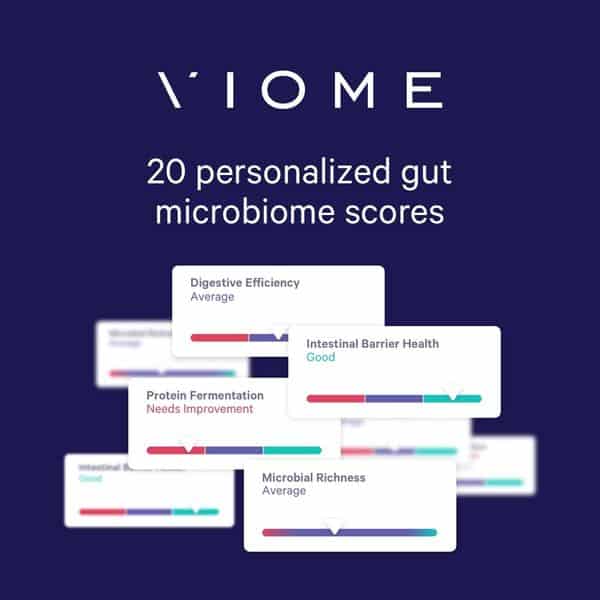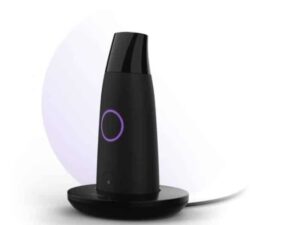As someone who has experienced firsthand the life-changing benefits of a well-functioning gut, I’ve often wondered how coffee influences the microbiome.
I’ve heard so much conflicting data on coffee consumption’s health benefits and detriments over the years that it was time to take a deep dive and find the truth, especially regarding its influence on the gut biome.

With over 2.25 billion cups consumed daily worldwide, I imagine I’m not the only one who would benefit from this information.1Robin Poole et al, Coffee consumption and health: umbrella review of meta-analyses of multiple health outcomesBMJ. 2017
After many hours of research, I’ve concluded that your daily cup of joe may influence your gut microbiome – the trillions of microbes residing in your digestive tract, which play a crucial role in your overall health.2Thursby E, Juge N., Introduction to the human gut microbiotaBiochem J. 2017
In fact, the dynamic relationship between coffee and gut health might make you appreciate your morning ritual even more.
This blog post will explore the fascinating interplay between coffee and gut health.
We’ll discuss how coffee can impact the composition and diversity of your gut microbiome and delve into coffee consumption’s potential benefits and drawbacks.
Furthermore, we’ll provide tips on how to enjoy your favorite brew without compromising your digestive wellness.
So grab a cup of your morning joe, afternoon cold brew, or whatever roast you’re sipping on, and let’s explore the relationship between coffee and gut health!
Biohack Your Brainpower
The Science Behind Coffee and Gut Health
Coffee’s impact on Gastrointestinal motility
Coffee has long been known to stimulate bowel movements, but the underlying mechanisms are still unraveling.
Research suggests that coffee can increase the motility of the smooth muscle in the gastrointestinal (GI) tract, helping to move stool through the colon more efficiently 3Brown SR, et al., Effect of coffee on distal colon functionnAliment Pharmacol Ther. 2011.
One study found that coffee consumption increased rectosigmoid motility within 4 minutes of ingestion, indicating its rapid effect on the GI tract 4Rao SS, et al., Is coffee a colonic stimulant?Gut. 1998.

The Effect of Coffee on the gut microbiome composition and Diversity
Coffee contains various bioactive compounds that can influence the gut microbiome.
For instance, a study showed that coffee consumption was positively correlated with increased levels of Bifidobacteria and Lactobacilli, both beneficial bacterial strains5Muriel Jaquet et al, Impact of coffee consumption on the gut microbiota: a human volunteer studyInt J Food Microbiol. 2009.
Conversely, coffee consumption has also been linked to a decrease in certain bacterial strains, such as Clostridium spp. 6Juerg Baggenstoss et al, Coffee Roasting and Aroma Formation: Application of Different Time-Temperature ConditionsJournal of Agricultural and Food Chemistry. 2008.
Factors such as coffee type, roasting level, and additives can all impact the gut microbiome composition.
In a study by Jaquet et al. (2019), the researchers investigated coffee consumption’s effects on healthy individuals’ gut microbiomes.
They compared the impact of three different types of coffee: caffeinated, decaffeinated, and green coffee.
Participants were given one of the coffee types for three weeks, followed by a washout period, and then switched to another.
The process was repeated until each participant consumed all three coffee types.
The results showed that the different coffee types had varying effects on the gut microbiome.
Green coffee, made from unroasted coffee beans, significantly increased the abundance of Bifidobacterium and Lactobacillus, considered beneficial bacteria for gut health.
Caffeinated coffee had a milder effect on these bacterial populations, while decaffeinated coffee did not show any significant impact.
The study concluded that factors such as coffee type, roasting level, and additives can all impact the gut microbiome composition7Muriel Jaquet et al, Impact of coffee consumption on the gut microbiota: a human volunteer studyInt J Food Microbiol. 2009.
The anti-inflammatory and antioxidant properties of coffee

Polyphenols, a group of plant compounds found in coffee, have demonstrated anti-inflammatory and antioxidant properties8Jara Pérez-Jiménez et al, Dietary intake of 337 polyphenols in French adultsAm J Clin Nutr. 2011.
These compounds can help protect the gut lining from inflammation and damage caused by harmful bacteria or toxins.
Furthermore, they can scavenge free radicals that cause oxidative stress and cellular aging 9David Vauzour et al, Polyphenols and Human Health: Prevention of Disease and Mechanisms of ActionNutrients. 2010.
The role of coffee’s bioactive compounds in gut health
Numerous bioactive compounds in coffee, such as caffeine, chlorogenic acids, and melanoidin, can impact gut health.
For example, caffeine may stimulate gastric acid secretion, while chlorogenic acids have been shown to have antimicrobial and prebiotic effects 10Giuseppe Grosso et al, Coffee, Caffeine, and Health Outcomes: An Umbrella ReviewAnnu Rev Nutr. 2017.
Melanoidins, formed during roasting, can act as dietary fiber and selectively promote the growth of beneficial gut bacteria 11Silvia Pastoriza et al, Contribution of melanoidins to the antioxidant capacity of the Spanish dietFood Chem. 2014.
Coffee Consumption: Potential Benefits for Gut Health
Coffee’s influence on gut motility and bowel movements
As mentioned earlier, coffee can stimulate bowel movements and alleviate constipation by increasing gastrointestinal motility12Brown SR, et al., Effect of coffee on distal colon functionnAliment Pharmacol Ther. 2011.
This can be particularly beneficial for individuals who suffer from chronic constipation or have difficulty initiating bowel movements.
The impact of coffee on beneficial bacterial strains
The increase in Bifidobacteria and Lactobacilli levels observed in coffee drinkers may contribute to overall gut health by enhancing the gut barrier function, modulating the immune system, and producing essential vitamins 13Muriel Jaquet et al, Impact of coffee consumption on the gut microbiota: a human volunteer studyInt J Food Microbiol. 2009,14O’Hara AM, Shanahan F., The gut flora as a forgotten organEMBO Rep. 2006
The potential role of coffee in reducing the risk of chronic diseases

Numerous studies have linked coffee consumption to a reduced risk of chronic diseases such as type 2 diabetes, cardiovascular diseases, and certain types of cancer 15van Dam RM, Hu FB, Coffee consumption and risk of type 2 diabetes: a systematic reviewJAMA. 200516Gunter MJ, et al., Coffee Drinking and Mortality in 10 European CountriesAnn Intern Med. 2017.
While the exact mechanisms remain unclear, these protective effects may be partially attributed to coffee’s influence on gut microbiome composition and function.
The effect of coffee on mood, energy levels, and neurotransmitter production
Coffee can enhance mood and energy levels by stimulating the production of neurotransmitters such as dopamine and serotonin 17Lucas M, et al., Coffee, caffeine, and risk of depression among womenIntern Med. 2011.
Moreover, research has shown that gut microbes can produce and modulate neurotransmitters, suggesting a connection between gut health and mental well-being 18Strandwitz P., Neurotransmitter modulation by the gut microbiotaBrain Res. 2018.
As such, coffee’s impact on the gut microbiome may also play a role in its mood-enhancing effects.
Potential Drawbacks of Coffee Consumption for Gut Health

Acid reflux and heartburn
Coffee can relax the lower esophageal sphincter, allowing stomach acid to flow back into the esophagus and cause acid reflux or heartburn 19Boekema PJ, et al., Coffee and gastrointestinal function: facts and fictionScand J Gastroenterol Suppl. 1999.
Furthermore, coffee’s acidity may exacerbate symptoms in individuals with gastroesophageal reflux disease (GERD) 20Author(s), The effect of decaffeination of coffee on gastro-oesophageal reflux in patients with reflux diseaseAliment Pharmacol Ther. 1997.
Gastritis and ulcers
Increased stomach acid production and reduced mucus secretion from coffee consumption can irritate the stomach lining, leading to gastritis or ulcers 21Kathrin Ingrid Liszt et al, Caffeine induces gastric acid secretion via bitter taste signaling in gastric parietal cellsProc Natl Acad Sci U S A. 2017.
However, it is essential to note that coffee’s role in ulcer development is still debated, as other factors, such as Helicobacter pylori infection and nonsteroidal anti-inflammatory drug use, play a more significant role 22Astrid Nehlig, Effects of Coffee on the Gastro-Intestinal Tract: A Narrative Review and Literature UpdateNutrients. 2022 .
Diarrhea and loose stools
Coffee can stimulate peristalsis and increase water secretion in the colon, potentially triggering diarrhea or loose stools 23Supatra Lohsiriwat, Effects of caffeine on anorectal manometric findingsDis Colon Rectum. 2008.
This effect may be exacerbated by coffee’s caffeine content, which has been shown to increase colonic motor activity24P B Dews et al, Caffeine: behavioral effects of withdrawal and related issuesFood Chem Toxicol. 2002.
Dehydration
Although moderate coffee consumption is unlikely to cause significant dehydration, excessive intake may increase urine output and reduce fluid intake, leading to dehydration 25Maughan RJ, Griffin J., Caffeine ingestion and fluid balance: a reviewJ Hum Nutr Diet. 2003.
Anxiety and insomnia
Overconsumption of coffee, especially in the evening, can overstimulate the central nervous system, leading to anxiety, insomnia, or sleep disturbances26O’Keefe JH, et al., Effects of habitual coffee consumption on cardiometabolic disease, cardiovascular health, and all-cause mortalityJ Am Coll Cardiol. 2013 .
Dependence and addiction
Regular coffee consumption can alter brain chemistry and cause withdrawal symptoms, leading to dependence or addiction 27Merideth A. Addicott, Ph.D., Caffeine Use Disorder: A Review of the Evidence and Future ImplicationsCurr Addict Rep. Author manuscript; 2015.
It is essential to maintain a healthy balance and avoid excessive coffee intake.
Enjoying Coffee Without Compromising Gut Health
Choose organic or low-acid coffee beans
Opt for organic coffee beans to reduce pesticide exposure and other harmful chemicals 28Shahnaj Akter et al, Why Organic Food? Factors Influence the Organic Food Purchase Intension in an Emerging Country (Study from Northern Part of Bangladesh)MDPI. 2023.
Additionally, consider low-acid coffee varieties, which can be gentler on the stomach and reduce the risk of acid reflux or gastritis 29Charlotte E Mills et al, The effect of processing on chlorogenic acid content of commercially available coffeename of publication. YEAR 30Nawrot P, et al., Effects of caffeine on human healthFood Addit Contam. 2003.
Avoid sugar and artificial sweeteners

Excessive sugar intake can disrupt the gut microbiome balance, promoting the growth of harmful bacteria 31Rosa Krajmalnik-Brown et al, Effects of gut microbes on nutrient absorption and energy regulationNutr Clin Pract. 2012.
Additionally, some artificial sweeteners have been linked to adverse effects on gut health 32Suez J, Korem T, Zeevi D, Zilberman-Schapira G, Thaiss CA, Maza O, Israeli D, Zmora N, Gilad S, Weinberger A, Kuperman Y, Harmelin A, Kolodkin-Gal I, Shapiro H, Halpern Z, Segal E, Elinav E., Artificial sweeteners induce glucose intolerance by altering the gut microbiotaNature. 2014.
Opt for natural sweeteners like honey or stevia, or enjoy your coffee without added sweeteners.
Stay hydrated
Drink water before or after coffee intake to counteract coffee’s potential dehydrating effects. Maintaining proper hydration is essential for gut health and overall well-being.
Conclusion
In conclusion, coffee’s impact on gut health is multifaceted and depends on factors such as coffee type, roasting level, and individual differences in gut microbiome composition.
Moderate coffee consumption may offer several gut health benefits, including improved bowel movements, increased beneficial bacterial strains, and reduced risk of chronic diseases.
However, excessive coffee intake may lead to potential drawbacks such as acid reflux, gastritis, and dehydration.
Following the practical tips in this article, you can enjoy your daily brew without compromising your digestive wellness.
- 1Robin Poole et al, Coffee consumption and health: umbrella review of meta-analyses of multiple health outcomesBMJ. 2017
- 2Thursby E, Juge N., Introduction to the human gut microbiotaBiochem J. 2017
- 3Brown SR, et al., Effect of coffee on distal colon functionnAliment Pharmacol Ther. 2011
- 4Rao SS, et al., Is coffee a colonic stimulant?Gut. 1998
- 5Muriel Jaquet et al, Impact of coffee consumption on the gut microbiota: a human volunteer studyInt J Food Microbiol. 2009
- 6Juerg Baggenstoss et al, Coffee Roasting and Aroma Formation: Application of Different Time-Temperature ConditionsJournal of Agricultural and Food Chemistry. 2008
- 7Muriel Jaquet et al, Impact of coffee consumption on the gut microbiota: a human volunteer studyInt J Food Microbiol. 2009
- 8Jara Pérez-Jiménez et al, Dietary intake of 337 polyphenols in French adultsAm J Clin Nutr. 2011
- 9David Vauzour et al, Polyphenols and Human Health: Prevention of Disease and Mechanisms of ActionNutrients. 2010
- 10Giuseppe Grosso et al, Coffee, Caffeine, and Health Outcomes: An Umbrella ReviewAnnu Rev Nutr. 2017
- 11Silvia Pastoriza et al, Contribution of melanoidins to the antioxidant capacity of the Spanish dietFood Chem. 2014
- 12Brown SR, et al., Effect of coffee on distal colon functionnAliment Pharmacol Ther. 2011
- 13Muriel Jaquet et al, Impact of coffee consumption on the gut microbiota: a human volunteer studyInt J Food Microbiol. 2009
- 14O’Hara AM, Shanahan F., The gut flora as a forgotten organEMBO Rep. 2006
- 15van Dam RM, Hu FB, Coffee consumption and risk of type 2 diabetes: a systematic reviewJAMA. 2005
- 16Gunter MJ, et al., Coffee Drinking and Mortality in 10 European CountriesAnn Intern Med. 2017
- 17Lucas M, et al., Coffee, caffeine, and risk of depression among womenIntern Med. 2011
- 18Strandwitz P., Neurotransmitter modulation by the gut microbiotaBrain Res. 2018
- 19Boekema PJ, et al., Coffee and gastrointestinal function: facts and fictionScand J Gastroenterol Suppl. 1999
- 20Author(s), The effect of decaffeination of coffee on gastro-oesophageal reflux in patients with reflux diseaseAliment Pharmacol Ther. 1997
- 21Kathrin Ingrid Liszt et al, Caffeine induces gastric acid secretion via bitter taste signaling in gastric parietal cellsProc Natl Acad Sci U S A. 2017
- 22Astrid Nehlig, Effects of Coffee on the Gastro-Intestinal Tract: A Narrative Review and Literature UpdateNutrients. 2022
- 23Supatra Lohsiriwat, Effects of caffeine on anorectal manometric findingsDis Colon Rectum. 2008
- 24P B Dews et al, Caffeine: behavioral effects of withdrawal and related issuesFood Chem Toxicol. 2002
- 25Maughan RJ, Griffin J., Caffeine ingestion and fluid balance: a reviewJ Hum Nutr Diet. 2003
- 26O’Keefe JH, et al., Effects of habitual coffee consumption on cardiometabolic disease, cardiovascular health, and all-cause mortalityJ Am Coll Cardiol. 2013
- 27Merideth A. Addicott, Ph.D., Caffeine Use Disorder: A Review of the Evidence and Future ImplicationsCurr Addict Rep. Author manuscript; 2015
- 28
- 29Charlotte E Mills et al, The effect of processing on chlorogenic acid content of commercially available coffeename of publication. YEAR
- 30Nawrot P, et al., Effects of caffeine on human healthFood Addit Contam. 2003
- 31Rosa Krajmalnik-Brown et al, Effects of gut microbes on nutrient absorption and energy regulationNutr Clin Pract. 2012
- 32Suez J, Korem T, Zeevi D, Zilberman-Schapira G, Thaiss CA, Maza O, Israeli D, Zmora N, Gilad S, Weinberger A, Kuperman Y, Harmelin A, Kolodkin-Gal I, Shapiro H, Halpern Z, Segal E, Elinav E., Artificial sweeteners induce glucose intolerance by altering the gut microbiotaNature. 2014














